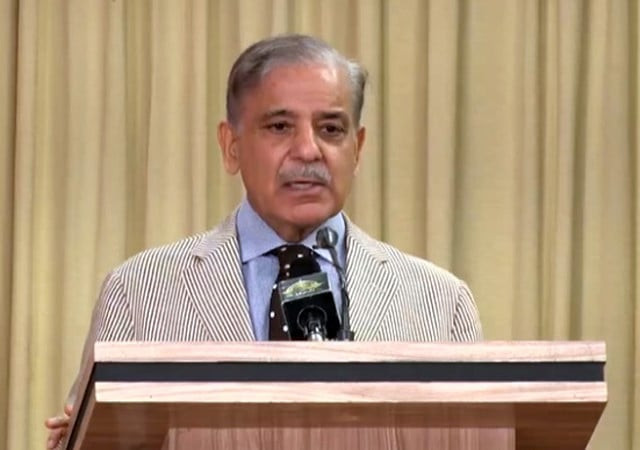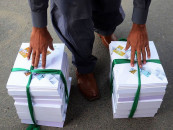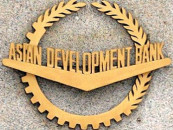Army to oversee economic revival
Civil-military leadership unveils plan for $1tr GDP by 2035

The civil-military leadership on Tuesday presented an “Economic Revival Plan”, stated to be bigger than the China-Pakistan Economic Corridor (CPEC), to address the nation’s continued struggles with growth.
The plan is focused on harnessing the country’s untapped potential in key sectors through local development and foreign investments mainly from “gulf countries” and expediting project implementation.
The government has established a ‘Special Investment Facilitation Council (SIFC)’, which will serve as a streamlined interface for investors and remove all the bottlenecks in investments with the help of the army.
The plan was unveiled during an event, chaired by Prime Minister Shehbaz Sharif and attended by the Chief of Army Staff (COAS) Gen Asim Munir, at the Prime Minister House. The chief ministers and key federal and provincial ministers were also present.
On the occasion, the prime minister stressed the need for export-oriented foreign direct investments (FDIs) while the army chief pledged full support of the military, recognising the plan’s importance for the national prosperity.
The plan envisages capitalising Pakistan’s untapped potential in key sectors of defence production, agricultural, livestock, minerals and mining, information technology and energy, through indigenous development as well as investments from friendly countries.
In his speech, Gen Asim assured army’s all-out support to complement the government’s efforts for the revival plan, considered to be fundamental to socio-economic prosperity of the Pakistanis and reclaiming Pakistan’s rightful stature in the comity of the nations.
The plan aims to foster collaboration between the Centre and provinces to promote timely decision-making and avoid duplication. It will promote the concepts of “one government” and “collective government” to remove all barriers to investment and business activities.
“This economic recovery project [SIFC] will prove to be a bigger economic project than CPEC,” a key cabinet minister told The Express Tribune. “The project is a “game-changer” for the development of Pakistan,” the minister added.
The minister stated that “investment will come from the gulf countries” and the “army will play a key role” in the coordination of the projects. “If this project is completed,” a source said, “by 2035, Pakistan could become a trillion-dollar economy”.
The new plan is announced just days before the 10th anniversary of the signing of CPEC deal, which was also dubbed as a “game changer” project. The project was signed on July 5, 2013 during the then Pakistan Muslim League-Nawaz (PML-N) government.
However, so far, less than $25 billion of Chinese investment has been made out of the planned amount of $62 billion due to Islamabad’s failure to honour its various commitments.
Now, the source said, under the SIFC, direct jobs opportunities would be provided to 15 to 20 million people and indirect job opportunities to another 75 to 100 million people in the next four to five years.
Along with this, the SIFC project will generate exports of $70 billion and “import substitution” of equal amount in the next four to five years. “The [SIFC] plan will also increase Pakistan’s foreign direct investment by $100 billion.”
The minister said that under the project foreign exchange reserves will also be enhanced in the next four to five years, which will lead to a reduction in the economic difficulties currently facing the country.
Commenting on army’s involvement in the project, government sources said that security and economy were closely related to each other “that’s why the Pakistan Army will spend all its energy in the management, coordination and the success” of the project.
“As this project becomes stronger and more stable,” another minister said, “the role of the army will gradually decline”. Also, the minister said, “the army will provide only management and technical support in this initiative to successfully complete the project”.
An official statement issued after the meeting stated that the establishment of SIFC has been undertaken to act as a ‘single-window’ interface for the potential investors as well as to adopt a unified approach to fast-track the development of projects.
It added that the set-up will “shorten hithertofore cumbersome and lengthy business processes” through a cooperative and collaborative “whole of the government approach” with the representation of all stakeholders.
The statement added that it was aimed at creating horizontal-vertical synergy between the federation and the provinces; facilitating timely decision-making; avoiding duplication of efforts; and ensuring swift project implementation.
“The high-ranking participation from federal and provincial governments, clearly manifests the national resolve to turn around the economy despite all odds,” the official statement read.
In his speech, Shehbaz recalled that the government inherited an economy, which was on the brink of collapse, but stressed that it was now being steered towards growth and development with bold and difficult decisions.
However, Shehbaz emphasised that there are massive challenges ahead. Export-oriented FDIs held the key to economic revival, he said, adding that the government had, therefore, decided to adopt a holistic and whole-of-government approach.
The new government approach, the prime minister told the participants, fostered partnerships within the federal and provincial governments for an effective implementation and execution of the project.
The investors would be given primacy and fast-track approvals through a well-coordinated approach, he continued. He observed that the expected investments would create jobs and livelihoods for the youth and women.
The prime minister stressed that the focus should be on empowering youngsters and women to realise their full potential. “Let us resolve to work together, leave no stone unturned and be single-minded in our focus and direction,” he extorted.
“We can transform the destiny of Pakistan and its people,” the prime minister said, adding that it would, however, not happen without hard work and staying the course on the path to progress and development.
Prime Minister Shehbaz said that Pakistan and the Pakistanis deserved nothing less from those who had been bestowed the responsibility to administer the country by Almighty Allah and the people of Pakistan.



















COMMENTS
Comments are moderated and generally will be posted if they are on-topic and not abusive.
For more information, please see our Comments FAQ